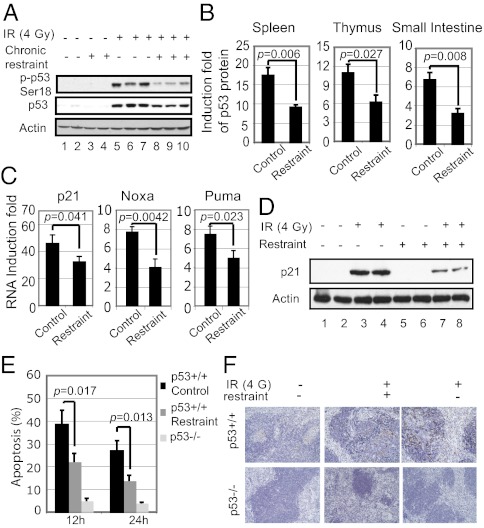Fig. 2.
Chronic restraint decreases p53 protein levels and function in transcriptional activity and apoptosis in response to IR in mice. Seven-week-old p53+/+ C57BL6/J male mice with or without chronic periodic restraint (6 h/day for 1 wk) were treated with 4 Gy IR, and various tissues were collected at different time points after IR (n = 5 per group). (A) Chronic restraint decreased the phosphorylation of p53 Ser18 (p-p53 Ser18) and accumulation of p53 protein in response to IR in the spleen. Levels of p-p53 Ser18 and p53 protein were determined at 6 h after IR by Western blot assays. (B) Chronic restraint decreased the accumulation of p53 protein induced by IR in different tissues. The induction fold of p53 protein in the spleen, thymus, and small intestine was determined at 6 h after IR by ELISAs. (C) Chronic restraint decreased the induction of p53 target genes. mRNA levels of p21, Noxa, and Puma were determined at 6 h after IR by Taqman real-time PCR and normalized with actin. (D) Chronic restraint decreased the protein levels of p21. Protein levels of p21 were determined at 6 h after IR by Western blot assays. (E and F) Chronic restraint decreased p53-mediated apoptosis in the spleen in response to IR. Splenocytes were isolated from the mice at 12 and 24 h after IR, stained with annexin V, and analyzed in a flow cytometer to detect apoptotic cells (E). TUNEL assay was used to detect apoptotic cells in spleen tissues at 12 h after IR (F).

